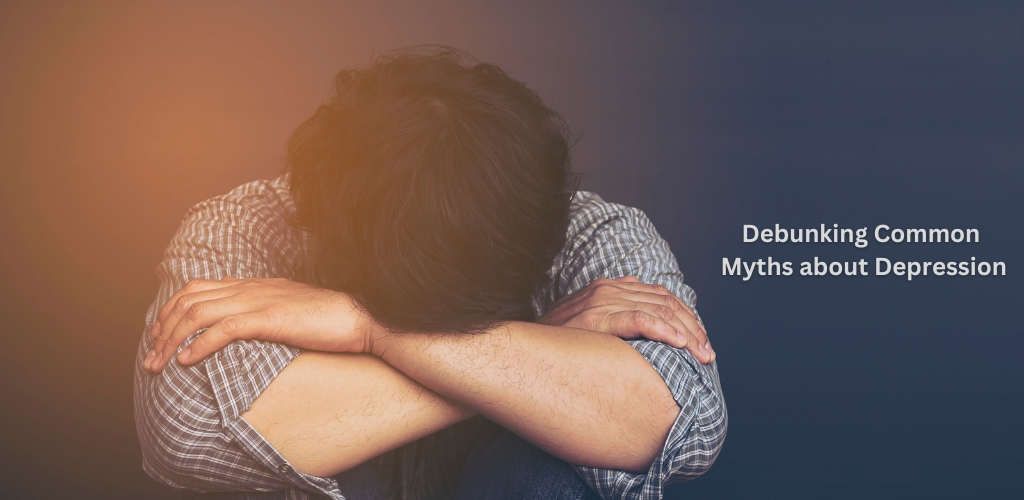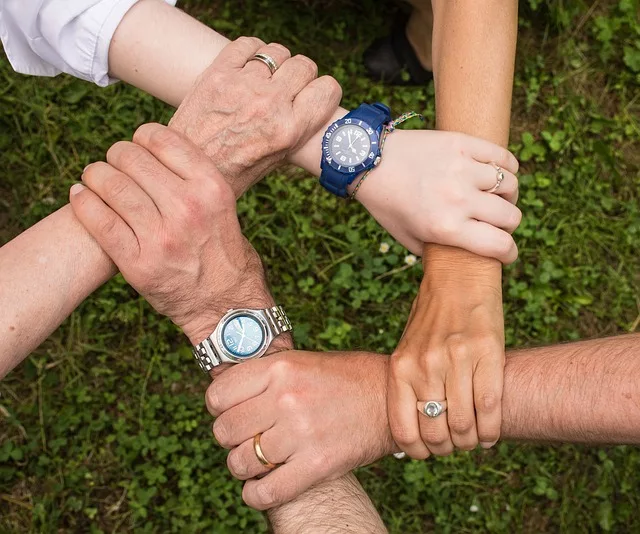
- Depression, often referred to as major depressive disorder, is a serious mental health problem that many people around the world struggle with. According to the World Health Organization (WHO), depression affects over 264 million people worldwide. That’s more than the entire population of Brazil!
However, even though so many people deal with depression, a lot of folks still don’t understand what it really is. There are many mistaken beliefs or myths about depression, and these myths can sometimes make people feel bad or misunderstood, and may even stop them from reaching out for help.
In this article, we’re going to talk about five of these myths. We’ll explain why they’re not true, and give you the real facts about depression instead. This will help us better understand what depression really is, and might also make it easier for people with depression to get the help and support they need. Our hope is to make the topic of depression a bit less confusing and scary, and instead, more clear and relatable.
At Inspire Malibu, we treat mental health disorders that co-occur with addiction, including depression. We’ve found that understanding what depression is – and what it is not – helps kickstart the process of recovery. If you or a loved one are suffering from depression, it might help to debunk some of the following myths.
Myth 1: Depression is Just a State of Sadness
First and foremost, many people believe that depression is just a prolonged state of sadness or “feeling down.” While sadness is indeed a common symptom of depression, it’s crucial to understand that depression encompasses much more. According to the American Psychiatric Association, depression can lead to a wide range of symptoms such as lethargy, feelings of worthlessness or guilt, loss of interest or pleasure in activities, difficulty concentrating, changes in appetite or weight, disturbed sleep, and sometimes unexplained physical aches or pains.
Consider John, who is a high-achieving lawyer. He used to love his job and enjoyed outdoor activities. However, for several months, he’s been feeling constantly fatigued, has lost interest in his job, and stopped going out. He’s not particularly sad, but he feels empty and doesn’t enjoy things like he used to. His experience is common, and it depicts how the depth of depression can go far beyond mere sadness, impacting various aspects of life.
- World Health Organization (2020). Depression. https://www.who.int/news-room/fact-sheets/detail/depression
- American Psychological Association (2020). Depression. https://www.apa.org/topics/depression/
- American Psychiatric Association (2013). Diagnostic and Statistical Manual of Mental Disorders (5th ed.). https://www.psychiatry.org/psychiatrists/practice/dsm
Myth 2: Depression is a Sign of Weakness or a Character Flaw
Another damaging myth is the perception of depression as a sign of personal weakness or a character flaw. This belief can engender feelings of shame in those with depression, potentially preventing them from seeking professional help. Depression is not a reflection of a person’s character or strength; rather, it’s a legitimate medical condition, akin to physical health problems like diabetes or heart disease.
Michelle is a successful athlete who has always been admired for her strength and resilience. Despite her achievements and strong will, she’s been diagnosed with depression. Her example shows that depression can affect anyone, irrespective of their personal qualities or accomplishments. In fact, choosing to acknowledge depression and get treatment is a far greater sign of strength than keeping it in.
Myth 3: Antidepressants Always Cure Depression
Antidepressants are medications that help many people with depression, but the idea that they always cure depression isn’t accurate.
According to a report by Harvard Medical School, about two out of three people who take an antidepressant don’t get completely better from that first medication. There could be several reasons for this. Firstly, everyone’s body is unique and may react to medication differently. This is why some people might need to try a few different medications until they find one that works best for them.
Secondly, depression is a complex condition that can be caused by many different things – like problems in our life, our genes, changes in our brain, or usually, a mix of these. So while medication can help balance the chemicals in our brain and make us feel better, it may not address all the reasons behind our depression.
Take Robert as an example. He was feeling really down and was having trouble sleeping and eating, so his doctor prescribed him an antidepressant. But after a few weeks, he didn’t notice much improvement in his mood or energy. His doctor then suggested adding psychotherapy, or “talk therapy,” to his treatment. During these therapy sessions, Robert learned new ways of thinking and coping with his problems, which, when combined with his medication, started to help him feel better.
This story shows us that while antidepressants can be a very important tool for treating depression, they’re not a “one-size-fits-all” solution. Different people might need different treatments or combinations of treatments – like medication, therapy, lifestyle changes, and social support – to effectively manage their depression.
- Harvard Health Publishing (2019). Depression: Summertime blues? https://www.health.harvard.edu/mind-and-mood/summertime-blues
- Mayo Clinic (2018). Depression (major depressive disorder). https://www.mayoclinic.org/diseases-conditions/depression/symptoms-causes/syc-20356007
- Harvard Health Publishing (2019). What are the real risks of antidepressants? https://www.health.harvard.edu/mind-and-mood/what-are-the-real-risks-of-antidepressants
Myth 4: Depression Leads to an Inability to Function
Many people expect individuals with depression to look perpetually teary-eyed while struggling to carry on with daily activities. However, the reality is a bit more complex. Depression can show up in different ways for different people, and not everyone with depression looks or acts the same way.
Some people with depression might be able to go to work, school, or other activities and seem like they’re doing just fine. This is sometimes called high-functioning or smiling depression. Despite their outward appearance, these people might still be struggling with deep feelings of sadness, hopelessness, or emptiness on the inside.
Emma’s story is all-too-familiar to many people suffering from depression. Emma is a top student at her school, always has a smile on her face, and seems like she has it all together. But what people don’t see is that when she’s alone, she often feels worthless and constantly tired. Even though she’s able to do well in school and put on a happy face, she’s still dealing with depression.
Why do some people with depression seem fine? Well, there can be many reasons. Some people are very good at hiding their feelings or don’t want others to worry about them. Others might not even realize they have depression because they’re still able to do their usual activities. They might think that because they’re not always sad or unable to get out of bed, they couldn’t possibly have depression.
But no matter how depression looks on the outside, it’s still a serious condition that can cause a lot of pain and difficulty for the person experiencing it. It’s important to remember that just because someone seems okay, it doesn’t mean they’re not struggling on the inside.
- American Psychological Association (2020) . Psyvhological Studies Offer Important Clues for Addressing Persistent Pain And Opioid Misuse https://www.apa.org/news/press/releases/2020/09/pain-issues-opioid-misuse
- Cleveland Clinic (2024). High Functioning Depression. https://health.clevelandclinic.org/high-functioning-depression
Myth 5: Depression is Not a Real Illness
Some people believe that depression is not a real illness, but just an overreaction to life’s normal ups and downs. However, this belief is far from the truth. Depression is a serious medical condition, just like diabetes or heart disease. It’s not just about feeling sad or down. Depression affects how we feel, think, and behave, and it can lead to a variety of physical and emotional problems.
One of the reasons why depression is a real illness is because it involves changes in the brain. Just like how an x-ray might show a broken bone, brain imaging studies have shown that the brains of people with depression look different than those of people without depression. Certain areas of the brain that are responsible for mood, thinking, sleep, appetite, and behavior may not work as they should.
Moreover, depression can cause physical symptoms that are very real. Many people with depression experience changes in their appetite (eating too much or too little), changes in their sleep (sleeping too much or having trouble sleeping), constant tiredness, and even unexplained aches and pains. Some people might also have trouble concentrating, remembering things, or making decisions.
Depression can also increase the risk of other health problems, like heart disease and diabetes. It can even influence how well these conditions are managed. For example, someone with depression and diabetes may struggle to keep up with their diabetes care, leading to worse health outcomes.
Depression also has a genetic component. Research has shown that having a family member with depression increases your risk, suggesting that our genes play a role in its development.
So, just like other medical conditions, depression is a complex illness that involves our brain, body, and genetics. It’s not just in our mind or something we can control with willpower. It’s a real illness that needs real treatment.
Conclusion

Depression is a very real, serious issue that lots of people are dealing with every day. But there are a lot of myths out there about depression that are just not true. These myths can make people who have depression feel misunderstood or even stop them from getting help.
But now, we’ve busted some of these myths. We’ve learned that depression is not just about being sad all the time or not being strong enough. We’ve seen that it’s not a “one-size-fits-all” condition and that antidepressants don’t always cure it straight away. We also know that it’s not just in our heads – it’s a real illness that can affect our brain, body, and even our genes.
Understanding the real facts about depression is super important. It helps us to better support people who are dealing with depression and encourage them to seek help when they need it. And if you’re someone who is struggling with depression, remember that it’s not your fault and you’re not alone – help is out there.
Remember, if you or someone you know is dealing with depression, it’s important to reach out to a healthcare professional who can provide guidance and help. There’s no shame in asking for help – in fact, it’s one of the bravest things you can do.
- Harvard Health Publishing (2018). What Causes Depression? https://www.health.harvard.edu/mind-and-mood/what-causes-depression
- Frontiers in Psychiatry (2018) Genetics Factors in Major Depression Disease https://www.ncbi.nlm.nih.gov/pmc/articles/PMC6065213/





